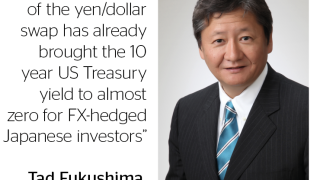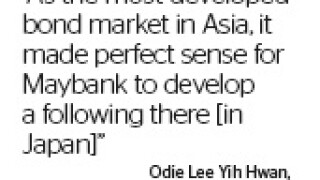Yen
-
Indiabulls Housing Finance has returned to the loans market for an up to $150m facility. The deal is denominated in yen and dollars, and follows a $200m borrowing sealed late last year.
-
Citic Group has become the first Chinese issuer to tap the Japanese yen market in 16 years, opening the door for borrowers from the mainland to access liquidity in the Samurai market.
-
In theory, the Bank of Japan’s gargantuan asset buying programme, which forms a central pillar of its quantitative and qualitative easing policy, should transform international capital markets by forcing Japanese investors overseas en masse. But as so often is the case in Japan, theory and practice are very different things.
-
The Province of Manitoba has printed ¥6bn ($59.3m) of 30 year paper, equalling the province’s longest ever note in the currency.
-
Mexico is likely to become the first Latin America sovereign to issue a Samurai bond this week after tightening guidance on a three and five year deal.
-
Panama-based Bladex became the second Latin American issuer to hit the increasingly popular Tokyo Pro-Bond market, whose flexibility is making access to yen easier for issuers.
-
Since Shinzo Abe was elected as prime minister in December 2012, ‘Abenomics’ has been a buzzword for international and domestic investors alike. Abe’s determination to turn the Japanese economy around, combined with the aggressive style of his hand-picked central bank governor, has brought unprecedented attention to Japan in a time of global volatility. That makes the job of communicating the strengths of the Japanese economy to investors all the more important. GlobalCapital sat down with Eiko Kimata, director for debt management and JGB investor relations at Japan’s Ministry of Finance, on March 11 to find out how investors have reacted to the central bank’s recent move into negative interest rates, how international investors are viewing the potential of the Japanese economy, and how the Ministry of Finance can best approach a tricky funding environment.
-
Santander Consumer Finance opened up a new Tokyo Pro-Bond programme worth €10bn on Tuesday, following a similar move from its UK sister borrower last year.
-
Santander Consumer Finance opened up a new Tokyo Pro-Bond programme worth €10bn on Tuesday, following a similar move from its UK sister borrower last year.
-
BPCE has registered to sell more Samurai subordinated bonds, looking to build on a successful debut in the format earlier this year, as European banks diversify their sources of new capital.
-
Deutsche Bank on Thursday priced its latest Samurai deal well wide of its last effort as investors continued to digest its restructuring, while wild swings in the basis swap between yen and dollars buffet other potential issuers in the format.
-
Maybank became the first Asia Pacific issuer to launch a Pro-Bond in May 2014. It was the bank’s first foray into the Japanese capital markets, and also represented a useful shot in the arm for the fledgling Pro-Bond initiative. Maybank has since graduated to a Samurai, allowing a useful comparison between the two markets.











